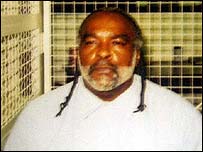
Governor Schwarzenegger of California had an opportunity today to make a bold statement about crime and punishment in the United States. Sadly, he chose to take the politically expedient path instead.
From The Capital Times:
Gov. Arnold Schwarzenegger on Monday refused to spare the life of Stanley Tookie Williams, the founder of the murderous Crips gang who awaited execution after midnight in a case that stirred debate over capital punishment and the possibility of redemption on death row.
Schwarzenegger was unswayed by pleas from Hollywood stars and petitions from more than 50,000 people who said that Williams had made amends during more than two decades in prison by writing a memoir and children's books about the dangers of gangs.
One of the cornerstone ideals of a liberal society is that no person, regardless of past actions, is beyond redemption. In the realm of criminal justice, this ideal must manifest as an opposition to state executions. As such, I am a staunch opponent of the death penalty in any and all cases. Sadly, I'm in the minority, both locally, as several Wisconsin Republican legislators introduce bills to bring back state executions for the first time in 150 years, and nationally, as is evidenced by a resurgence of public support for the death penalty.
The "Tookie" Williams case is a prime example of one of the many reasons why state executions are abhorrent. No matter what Williams may have done (he proclaims his innocence to this day), it is clear from his actions and his writings that he is not the same young man convicted of four homicides and sentenced to death. Williams is a man that recognized the error of his ways, and justice would be served to let him continue to demonstrate his commitment to a better life. Schwarzenegger's decision will certainly be popular with some and will likely help boost his standing among the Republican party's more conservative members. But a man's life is a terrible price to pay for political expediency.
The question of clemency in this case was never about guilt or innocence, although supporters of state executions must tacitly accept that some innocent people will be killed. Our justice system is administered by humans and is prone to human error. Such acceptance of "collateral damage" seems somewhat hypocritical given conservative's frequent breast-thumping about "a Culture of Life". The question of clemency as it regards Williams is one of mercy and the answer from California was "No mercy for you".
State executions are an abomination, a sad throwback to a more medieval human culture. For those conservatives, both Republican and Democrat, concerned about the "coarsening of the culture" take note: nothing coarsens America like investing the government with the power to murder its citizens. Because that's exactly what the death penalty is: state sponsored murder of Americans. It's never been shown to deter crime, unless used to a draconian degree with which no American could be comfortable.
Proponents of the death penalty like to hide behind the word "justice". They seem to draw the idea from the Old Testament verse "An eye for an eye, a tooth for a tooth, a life for a life", which is, in turn, taken from the Law Code of Hammurabi. Such a simplistic view of the law is an embarrassment to a civilized, modern society. This view results in a society of the lowest common denominator, where violence begets violence in an ugly circle of injury and revenge.
That's what the death penalty is really about: revenge. The animalistic need of many people to see swift violence carried out to avenge their crude sense of justice. The murder of "Tookie" Williams won't bring back any of his victims. It won't undo the damage done by any crime. It will only, briefly, satisfy many American's need to feel more powerful than those behind bars, to feel as though they are the Citizens giving a fatal "thumbs down" to the plebe in the arena.
Farewell, then, to Stanley "Tookie" Williams, a man whose murder will stand as mute testament to a populace willing to trade his life for a false sense of comfort and empowerment. And farewell, also, to another small piece of American idealism, the idea that anyone, no matter what their beginnings, can achieve a better life.

No comments:
Post a Comment